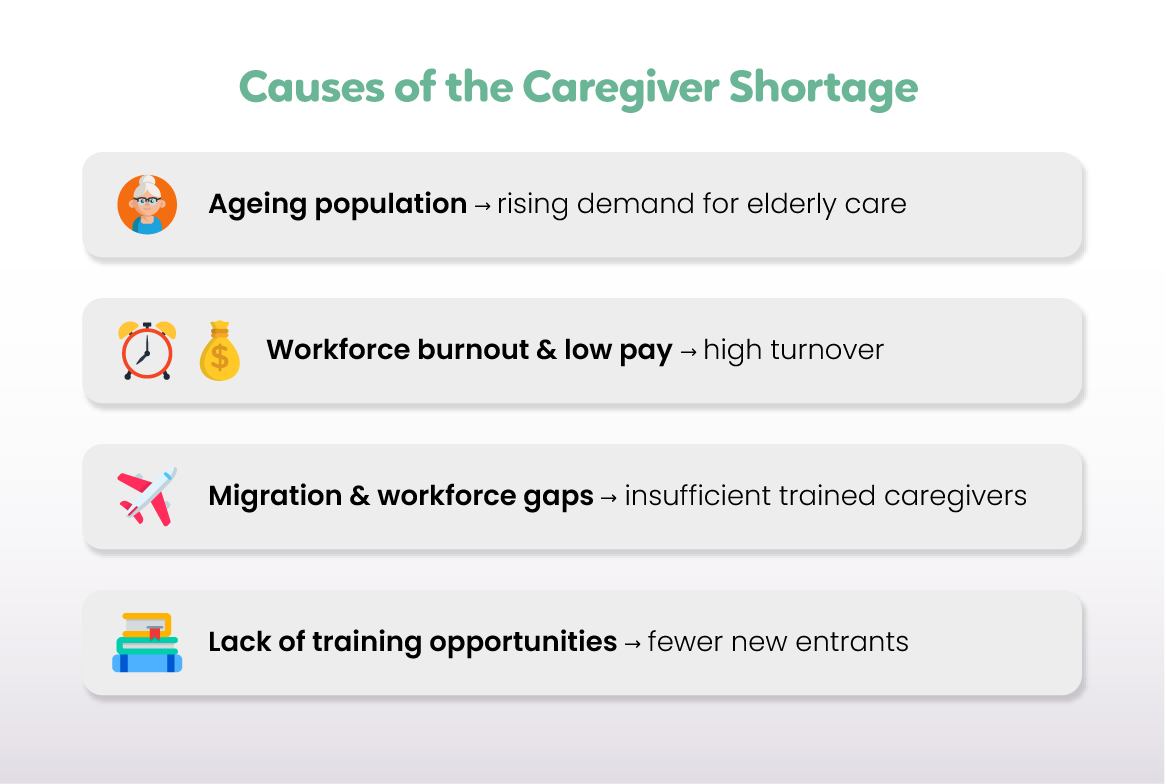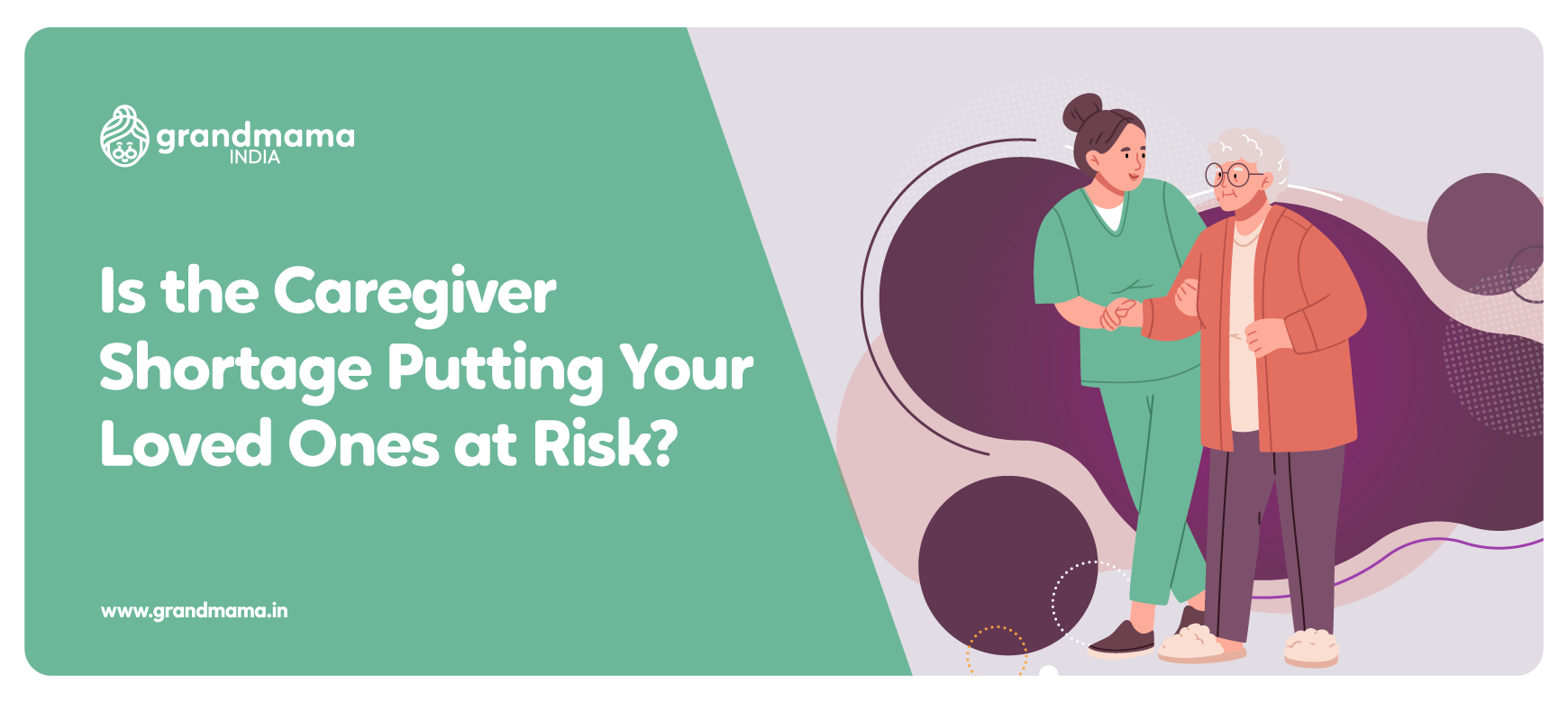Understanding the Global Caregiver Shortage
The world is facing a serious caregiver shortage, and it’s not just a matter of statistics—it’s a human issue that touches elderly people, families, and the caregivers themselves.
According to the World Health Organization, the global health and care workforce is projected to fall short by 10 million workers by 2030. This isn’t just about hospitals or clinics—it directly impacts home care, elderly care, and the people who depend on these services.
The shortage is more than just unfilled vacancies:
- Families are struggling to find reliable caregivers.
- Workers face burnout and difficult working conditions.
- Elderly people may experience inconsistent or lower-quality care.
The caregiver workforce shortage is becoming one of the most pressing issues of our time.
What Is Causing the Global Caregiver Shortage?
Several interconnected factors explain why the shortage of caregivers continues to grow across Europe and beyond.

1. An Ageing Population
Europe is ageing faster than many other regions. According to Eurostat, nearly 21% of Europe’s population is aged 65 or older, with Greece among the highest at over 23%. As life expectancy increases, so does the need for long-term care and daily support.
2. Workforce Burnout and Low Pay
Caregiving is a highly demanding profession—physically, mentally, and emotionally. Yet, wages often don’t match the responsibility. In many European countries, staff turnover is high because workers cannot balance the workload and compensation.
3. Migration and Workforce Gaps
Many European countries rely on migrant caregivers. However, restrictive immigration frameworks, coupled with growing competition between nations for healthcare workers, have reduced the available pool of carers.
4. Lack of Training Opportunities
Even when people are interested in caregiving, the absence of structured training and career progression discourages them from entering or staying in the field.
How Does the Caregiver Shortage Affect Families?
The caregiver shortage isn’t just a workforce problem—it affects families at the most personal level.
- Emotional strain: Families often step in as unpaid carers, balancing jobs and personal lives while managing elderly care.
- Financial burden: Rising demand for private caregiving increases costs, putting strain on middle-income households.
- Reduced quality of life: Elderly people without stable care may experience loneliness, missed treatments, or reduced independence.
A takeaway worth remembering:
“When caregivers are missing, families carry the weight—and the true cost is paid in stress, health, and relationships.”
How Does Caregiver Shortage Impact Elderly Care Quality?
The effects on care quality are evident across Europe:
- Fewer carers per patient → less time for personal connection
With fewer caregivers available, each worker has to attend to more people, leaving less time for meaningful interaction. This can affect emotional well-being and the sense of companionship for elderly individuals.
- Increased turnover → elderly people constantly adjusting to new caregivers
High staff turnover means elderly people often meet new carers, disrupting routines and trust. Frequent changes can lead to confusion, stress, and reduced quality of care.
- Irregular availability → gaps in essential daily support
When caregivers are inconsistent or unavailable, daily tasks like medication management, meals, and personal care can be missed. These gaps directly impact the safety and comfort of elderly individuals.
Research published in the BMJ confirms that caregiver shortages are directly linked to reduced care safety and poorer outcomes in long-term care facilities.
Elderly Care Staffing Issues in Greece and Europe
Greece’s Reality
Greece has one of the oldest populations in Europe, with nearly 1 in 4 citizens aged 65 or over . The demand for carers far outweighs supply, leaving families heavily dependent on private or migrant caregivers. Financial pressures add to the strain, with hospitals and care homes often operating with fewer staff than needed.
The European Picture
The European Commission projects that demand for long-term care will rise by 50% by 2040. Yet, the caregiving workforce is shrinking, creating a gap that governments and families are struggling to fill.
This mismatch leaves elderly people vulnerable and families under pressure.
Challenges Faced by Care Workers
The challenges in caregiving are significant and explain why so many leave the profession:
- Low pay despite high responsibility
Caregivers often handle demanding tasks, from medical support to emotional care, yet their wages rarely reflect this workload. This mismatch makes the profession financially unsustainable for many.
- Physical and emotional exhaustion
Long hours, physically demanding work, and constant emotional engagement can lead to burnout. Many caregivers struggle to maintain their own health while caring for others.
- Limited recognition despite being essential workers
Despite being critical to elderly care and family support, caregivers often receive little societal or institutional acknowledgment. This lack of recognition affects morale and job satisfaction.
- Few opportunities for career growth
Caregiving roles frequently have limited pathways for advancement or professional development. Without clear growth prospects, talented workers may leave the sector for other fields.
Unless conditions improve, the healthcare staffing crisis will continue to worsen.
What Are the Consequences of Healthcare Worker Shortages?
The consequences of caregiver shortages ripple through society:
1.For elderly people – Inconsistent care, reduced companionship, higher safety risks.
When caregivers are in short supply, elderly individuals may miss essential daily support and medical attention. This can lead to loneliness, reduced independence, and increased safety concerns.
2.For families – Taking on unpaid caregiving roles
Families often step in to fill caregiving gaps, which can cause stress, financial strain, and health issues. Balancing work and caregiving responsibilities becomes a major challenge.
3.For caregivers – Burnout, stress, and leaving the profession altogether.
Existing caregivers face heavy workloads and emotional pressure, leading to exhaustion and high turnover. Many leave the profession, worsening the shortage.
4.For society – Increased healthcare costs and strain on social systems.
A shortage of trained caregivers increases demand for emergency services and long-term care facilities. This puts pressure on healthcare budgets and social support systems.
As one expert put it:
“The caregiver shortage is not just a staffing gap—it’s a social challenge that touches every household sooner or later.”
How Can Long-Term Care Address Staffing Gaps?
Addressing the caregiver workforce shortage requires a long-term vision and immediate action. Solutions include:
- Raising wages and improving conditions to retain workers
Better pay and improved working conditions make caregiving roles more sustainable. Valuing caregivers helps reduce turnover and keeps experienced staff in the sector.
- Training and education programmes to bring in new entrants
Offering structured training and skill development attracts new workers and ensures they are well-prepared for the demands of caregiving. This strengthens the workforce for the long term.
- Flexible migration policies to attract skilled caregivers
Welcoming trained caregivers from other countries helps fill immediate staffing gaps. Policies that support migration ensure families have access to competent, reliable care.
- Investment in technology such as digital scheduling and telehealth
Digital tools and telehealth systems reduce administrative burdens and improve efficiency. This allows caregivers to focus more on providing quality care rather than paperwork.
Governments across Europe are experimenting with reforms, but families often need immediate solutions.
Why Skilled Caregivers from India Are Part of the Solution
While Europe struggles with an ageing population and a shrinking workforce, countries like India have an abundance of skilled and compassionate caregivers. Caregiving in India is deeply rooted in cultural respect for elders, and many workers receive professional training.
This is where platforms like Grandmama come in. Grandmama bridges the gap by connecting families with trusted caregivers from India, helping meet the rising demand abroad while ensuring families have reliable, long-term support.
Reach out to Grandmama today to find the right caregiver for your loved one.
It’s not just about filling staff shortages—it’s about ensuring elderly people receive the dignity, companionship, and consistent care they deserve.
FAQs on the Global Caregiver Shortage
1. How does caregiver shortage affect families?
Families often step in as unpaid carers, leading to stress, financial strain, and less time for their own lives. This impacts both family caregivers and elderly relatives.
2. What is causing the global caregiver shortage?
Key factors include ageing populations, workforce burnout, limited training, and restricted migration opportunities.
3. How does caregiver shortage impact elderly care quality?
It reduces personal attention, increases turnover of carers, and creates gaps in daily support, which can harm overall well-being.
Towards a More Caring Future Amid the Caregiver Shortage
The global caregiver shortage is reshaping family life across Europe, with Greece among the most affected. Elderly people need care that preserves dignity and independence, but without enough caregivers, quality of life suffers.
At the same time, solutions exist. By valuing and supporting caregivers, training new entrants, and welcoming skilled professionals from abroad, the crisis can be eased.
Grandmama plays a quiet but important role in this journey—connecting families with trained Indian caregivers who bring both skill and compassion to those who need it most.
Because at its heart, caregiving is about more than staffing—it’s about love, dignity, and ensuring no one grows old alone.
